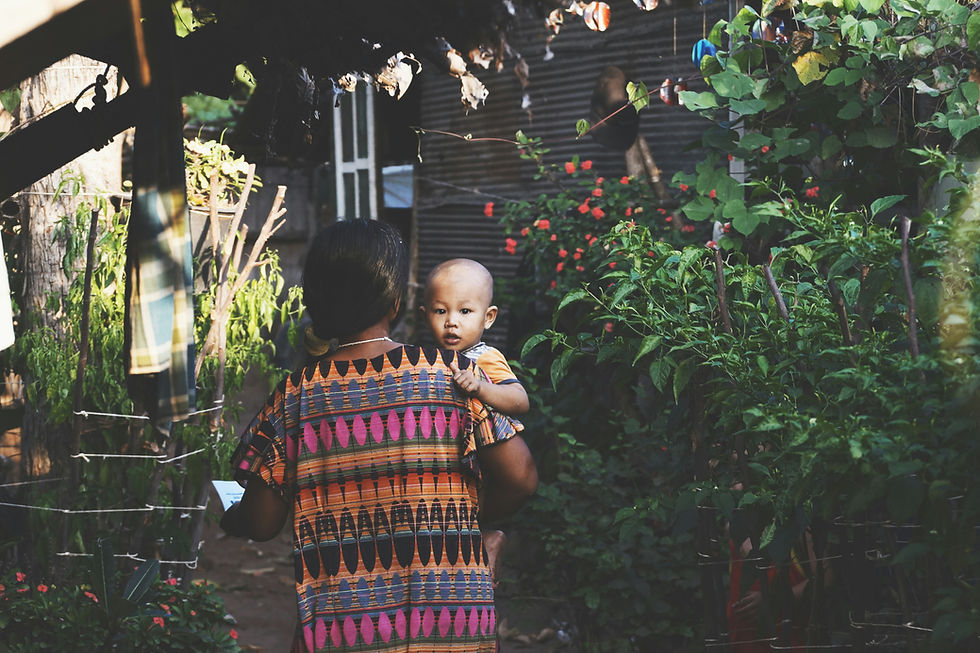Thailand’s push for better postnatal depression care
- Tara Abhasakun—Thailand
- Sep 2, 2025
- 6 min read
Many Thai women face postnatal depression without timely help due to stigma and limited awareness. Experts call for better education and expanded mental health support to improve care and outcomes.

In Thailand, stress, relationship problems, and role transitions can contribute to postnatal depression. Photo: Aleksandar Popovski
Too often, the women Dr Keerati Pattanaseri treats for postnatal depression at a hospital in Bangkok do not start receiving help for their condition until it is almost too late. “For many, seeking treatment is a last resort due to lack of awareness, stigma, or the belief that their distress is a normal part of motherhood,” says Pattanaseri, a consultant psychiatrist and assistant professor at the Faculty of Medicine Siriraj Hospital at Mahidol University.
She says the condition is often overlooked by the medical community and broader public, and only a small number of women seek help at psychiatric clinics. “[Some women] are referred only when symptoms become severe: usually when they feel overwhelmed or experience suicidal thoughts.”
Pregnancy and childbirth are celebrated as milestones in a woman’s life, yet postnatal depression remains a misunderstood and often poorly treated condition for women everywhere. In Thailand, experts say that although the condition is rarely misdiagnosed, a lack of societal awareness and persistent stigma continues to impede early detection, timely treatment, and open discussion of maternal mental health.
Understanding postnatal depression
Postnatal depression is a type of depression that parents, particularly women, can experience after giving birth. Common symptoms include persistent sadness and low mood, intense anxiety, lack of energy and feeling tired all the time, difficulty caring for themselves and their baby, and withdrawing from contact with other people. Mothers with postnatal depression are at higher risk of suicidal behaviour.
In Thailand, factors like stress associated with financial difficulties, relationship problems, and role transitions can contribute to postnatal depression.
Virtually all women can potentially develop mental disorders during pregnancy and in the first year after delivery; but poverty, extreme stress, emergency and conflict situations, and low social support increase the risk. An estimated 13% of women who have just given birth experience a mental disorder, primarily depression, according to the World Health Organization (WHO). Prevalence rates are significantly higher in low- and middle-income countries (LMICs), where nearly 20% of postpartum women are affected.
In Thailand, Pattanaseri says factors like stress associated with financial difficulties, relationship problems, and role transitions can contribute to postnatal depression; a 2024 study found 17% of women were affected at six weeks postpartum. Research in 2019 identified higher prevalence of postnatal depression (22%) among women in the country's northeastern and largely rural Sakon Nakhon province.
Dr Nitikorn Phoosuwan, an associate professor at the Faculty of Public Health of Thammasat University and a co-author of the 2019 study, says low socioeconomic status is associated with mental health conditions like postnatal depression. He explains Thai women from low-income households often face significant barriers to accessing mental healthcare, not because of treatment costs—which can be as low as US$1 per session—but due to high transportation expenses and lost daily wages. These financial pressures can prevent women from seeking help and may worsen mental health conditions like postnatal depression over time.
Higher-income women are also vulnerable. Pattanaseri notes that for such women, pregnancies that do not align with their expectations are another contributing factor. “For example, they may have wanted a child of a different gender, a different timing, or have had ambivalence about the pregnancy.”
Postnatal depression is not baby blues
Crucially, postnatal depression is different from the so-called baby blues, which do not typically last for more than two weeks after giving birth. Postnatal depression usually occurs two to eight weeks after delivery but can persist up to a year after the baby is born.
“Symptoms such as fatigue, poor sleep, and low mood are frequently attributed to normal postpartum adjustment.”
Confusion between the two conditions, Pattanaseri says, often leads to postnatal depression being overlooked rather than misdiagnosed. “Symptoms such as fatigue, poor sleep, and low mood are frequently attributed to normal postpartum adjustment,” she explains.
Dr Chutima Roomruangwong, professor of psychiatry at Chulalongkorn University and physician at the university’s hospital, agrees. In her experience, she says, “Postnatal depression is seldom misdiagnosed by clinicians due to its unique presentation… and might be passed over by lay people as [though] it is only baby blues, which most lay people think is a normal reaction, self-remitted, and no specific medical attention [is] needed.”
Like Pattanaseri, Roomruangwong says many women are only referred for medical care when symptoms are severe and they feel suicidal. Most families make an effort to support mothers in caring for their babies by providing practical help, but “they might not recognise it as a psychiatric illness that needs medical attention until it turns severe”.
Compounding this lack of awareness are significant gaps in postpartum care, which means many cases of postnatal depression go undetected and untreated. Pattanaseri says routine postpartum care in Thailand includes up to three visits within the first six weeks after birth, focusing mainly on physical health and newborn care. She notes that screening for postnatal depression is not part of standard care, though some facilities may offer it informally.
Roomruangwong says her hospital uses the Edinburgh Postnatal Depression Scale to screen pregnant and postpartum women for symptoms of emotional distress. Mothers who score 11 or higher are evaluated by a psychiatrist and have a follow-up hospital appointment to check for postnatal depression. Phoosuwan says that in some regions local healthcare workers go to the homes of postpartum women to provide screening for postnatal depression if they do not turn up for routine appointments.
If screening or treatment is provided at public hospitals, it is fully covered by universal health coverage. In contrast, postpartum checkups in private facilities can cost between THB1,500 and THB3,000 (US$46–US$92).
Stigma and gaps in care
While many Thai families strive to support loved ones having postnatal depression, societal stigma surrounding the condition, and mental health more broadly, remains deeply rooted. Cultural expectations to “save face” can entrench fear and shame around mental health conditions. Phoosuwan attributes this stigma to a general lack of knowledge about mental health issues, especially the causes for these conditions. More understanding, he says, would lead to less stigma.

Stigma related to postnatal depression still exists in Thailand. Photo: Getty Images
Pattanaseri says it is common for women to fear being judged as weak or failing in their role as mothers. She notes that expectations that motherhood should be joyful, combined with limited public understanding of mental health, contribute to this stigma. “Family members and even healthcare providers may [not give much credence to] symptoms, viewing them as normal stress [associated with early motherhood] or hormonal changes, which further discourages women from seeking help.”
What is more, mental health remains underfunded in Thailand. Women’s mental health, particularly around the perinatal period, is “frequently deprioritised in favour of physical health or broader psychiatric conditions”, Pattanaseri says.
Some experts also believe that the country’s inconsistent parental leave entitlements contribute to the problem. New laws passed in July ensure that women employed by private companies will be eligible for 120 days of paid leave, and men, 15 days. However, only women who work in the formal sector are granted maternity leave. As of 2019, nearly 50% of women in Thailand’s labour force were employed in the informal sector, and therefore not granted maternity leave.
“Such limited time off can increase stress, hinder recovery, and reduce bonding time with the baby, all of which raise the risk of perinatal depression,” Pattanaseri says, adding that a lack of paternity leave in most sectors also reinforces unequal caregiving roles, putting more pressure on mothers.
Towards progress in Thailand
Future efforts should focus on developing a national policy for perinatal mental health that integrates routine screening and support into maternal care, Pattanaseri says. “For urban women, expanding access to trained mental health professionals and workplace support is key. In rural areas, task-sharing models, such as training community health workers to provide basic psychosocial support, can bridge service gaps.”
Phoosuwan says this sort of approach may help alleviate a major barrier to care for rural women with postnatal depression, which is access to trained mental health professionals. “They live far away, [often] more than 30 km from the hospital… and they need to pay for a taxi,” he says.
He also emphasises the importance of local government involvement in changing the conversation about maternal mental health in Thailand. The local administration needs to be more proactive while allocating resources, he says. “The officials get money from the government; so if they understand mental health-related issues well, they can provide support where relevant.”
Whether women can take antidepressants while breastfeeding is another issue that needs clear guidance and greater public awareness. Roomruangwong says that over the past five years, media coverage has helped raise awareness. However, she notes that many women hesitate to use antidepressants while breastfeeding, despite evidence that some treatments are safe for breastfed infants.
Despite all these problems, progress is underway, and experts agree that with sustained public education and policy commitment, Thailand can build a more responsive and informed system—one where maternal mental health problems are recognised early and treated with the urgency they deserve.


